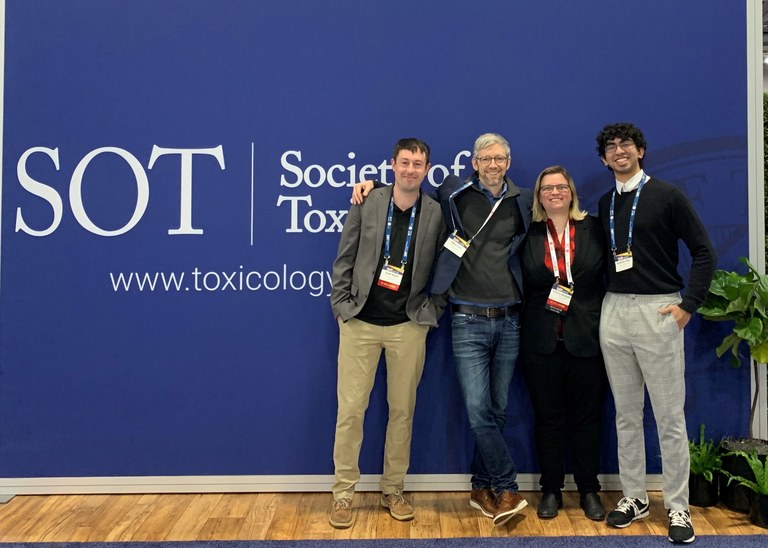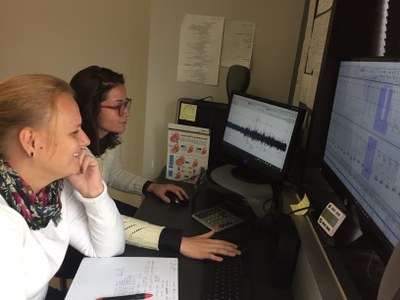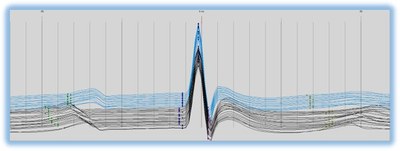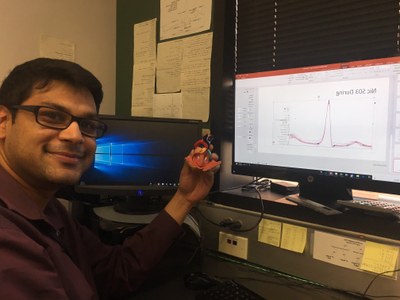The Carll Laboratory
Investigating how airborne toxicants and other environmental stressors affect cardiac function to guide government policies and inform the public.

Research


 Exposure to airborne toxicants is tied to arrhythmia, cardiac arrest, and heart failure in the general public. Our team seeks to validate and better understand these associations. We investigate how inhaled toxicants impair cardiac conduction and contraction in both rodents and humans, with particular interest in the nervous system’s role. We study the impacts of multiple toxicants, including e-cigarette aerosols, volatile organic compounds, and particulate matter from many sources (automobiles, urban atmospheres, and consumer products).
Exposure to airborne toxicants is tied to arrhythmia, cardiac arrest, and heart failure in the general public. Our team seeks to validate and better understand these associations. We investigate how inhaled toxicants impair cardiac conduction and contraction in both rodents and humans, with particular interest in the nervous system’s role. We study the impacts of multiple toxicants, including e-cigarette aerosols, volatile organic compounds, and particulate matter from many sources (automobiles, urban atmospheres, and consumer products).
Current Investigative Questions
In both rodents and humans, the Carll lab investigates;
- What are the neural and cellular pathways underlying pollutant-induced myocardial dysfunction and remodeling?
- How do e-cigarette aerosols adversely affect cardiac function, intracellular signaling, and neuroregulation?
- How do constituents contribute to the cardiac risks of exposure to e-cigarette aerosols?
Findings
Lab Members
Alex Carll, PhD, MSPH
Anand Ramalingam, PhD – Postdoctoral Researcher
Sean Raph, PhD – Postdoctoral Researcher
Brittany Reynolds, BS – Doctoral Student
Romith Paily – Undergraduate Student
Alumni
Affan Irfan, MD, PhD
Kyle Fulghum, MS
Claudia Arab, PhD
Renata Salatini, PhD
Nazratan Naeem
Positions and Education
Positions
Assistant Professor (tenure-track), Department of Physiology, School of Medicine, University of Louisville
Education
Post-Doc, 2013-2015, Harvard University, T.H. Chan School of Public Health, Molecular and Integrative Physiological Sciences.
Ph.D. 2012, University of North Carolina (UNC)-Chapel Hill, Gillings School of Global Public Health, Environmental Health Sciences.
M.S.P.H. 2008, UNC-Chapel Hill, School of Public Health, Environmental Sciences & Engineering.
A.B. 2004, Duke University, Environmental Science & Policy
Prior Training
Pre-doctoral Fellow, 2006-2012, U.S. Environmental Protection Agency, National Health and Environmental Effects Research Laboratory, Cardiopulmonary and Immunotoxicology Branch.
Post-doctoral Research Fellow, 2013-2015, Harvard School of Public Health, Dept. of Environmental Health, Program in Molecular and Integrative Physiological Sciences
News and Media
- U.S. News & World Report Vaping Might Trigger Irregular Heartbeat, Animal Studies Show, October 28, 2022
- WLKY News, Louisville UofL receives $3.6 million to research health effects of vaping flavors, June 28, 2022
- WLKY News, Louisville UofL study reveals e-cigarettes cause cardiac arrhythmias, October 25, 2022
- Daily Mail E-cigarettes may cause deadly irregular heartbeats… just like normal tobacco, study suggests, October 25, 2022
- Yahoo!News ‘Highly Concerning’: E-cigarettes can cause heart arrhythmias, study finds, October 26, 2022
- The Debate on France 24, Generation vape: How dangerous are e-cigarettes?, September 12, 2019
- Radio New Zealand, NZ should be worried about Juul vaping device – US professor, July 11, 2019
- DW News, The Day with Alex Carll and Aruni Bhatnagar, May 31, 2019
- The New York Times, Scientists Wanted: Recruited by Juul, Many Researchers Say No, May 27, 2019
Selected Publications
Find all papers and citations via ResearchGate or the National Library of Medicine
- Kucera C, Ramalingam A, Srivastava S, Bhatnagar A, Carll AP. Nicotine formulation influences the autonomic and arrhythmogenic effects of electronic cigarettes (2024). Nicotine Tob Res. 26(4):536-544. PMID: 38011908.
- Carll AP, Arab C, Salatini R, Miles MD, Nystoriak MA, Fulghum KL, Riggs DW, Shirk GA, Theis WS, Talebi N, Bhatnagar A, Conklin DJ (2022). E-cigarettes and their lone constituents induce cardiac arrhythmia and conduction defects in mice.Nature Communications. 13(1):6088. PMID: 36284091. PMCID: PMC9596490.
- Irfan AB, Arab CA, DeFilippis AP, Lorkiewicz PL, Keith RJ, Xie Z, Bhatnagar A, Carll AP (2021). Smoking accelerates atrioventricular conduction in humans concordant with increased dopamine release. Cardiovasc Toxicol. 21(2):169-178. PMID: 33043409. PMCID: PMC7855806.
- Raimundo RD, Sata MA, Dias da Silva T, de Abreu LC, Valenti VE, Riggs DW, Carll AP (2021). Open and Closed Endotracheal Suction Systems Divergently Affect Pulmonary Function in Mechanically Ventilated Subjects – a quasi-randomized clinical trial. Respir. Care. 66(5):785-792.PMID: 33688090.
- Inhalation of printer-emitted particles impairs cardiac conduction, hemodynamics, and autonomic regulation and induces arrhythmia and electrical remodeling in rats. Part Fibre Toxicol. 2020 Jan 29;17(1):7. doi: 10.1186/s12989-019-0335-z. PubMed PMID: 31996220; PubMed Central PMCID: PMC6990551.
- Conklin DJ, Schick S, Blaha MJ, Carll A, DeFilippis A, Ganz P, Hall ME, Hamburg N, O'Toole T, Reynolds L, Srivastava S, Bhatnagar A. Cardiovascular injury induced by tobacco products: assessment of risk factors and biomarkers of harm. A Tobacco Centers of Regulatory Science compilation. Am J Physiol Heart Circ Physiol. 2019 Apr 1;316(4):H801-H827. doi: 10.1152/ajpheart.00591.2018. Epub 2019 Feb 1. Review. PubMed PMID: 30707616; PubMed Central PMCID: PMC6483019.
- da Silva TD, Massetti T, Crocetta TB, Monteiro CBD, de Abreu LC, Oliveira FR, Arbaugh C, Carll A, Godleski JJ, Ferreira C (2018). Heart rate variability and cardiopulmonary dysfunction in patients with Duchenne muscular dystrophy. Pediatr Cardiol. 39(5):869-883 PMID: 29696428
- Carll, A., Farraj, A., & Roberts, A. (2018). The Role of the Autonomic Nervous System in Cardiovascular Toxicity. Comprehensive Toxicology, 61–114. doi: 10.1016/b978-0-12-801238-3.64259-9
- Carll AP, Crespo SM, Filho MS, et al. Inhaled ambient-level traffic-derived particulates decrease cardiac vagal influence and baroreflexes and increase arrhythmia in a rat model of metabolic syndrome.Part Fibre Toxicol. 2017;14(1):16. Published 2017 May 25. doi:10.1186/s12989-017-0196-2
- Carll AP, Haykal-Coates N, Winsett DW, et al. Cardiomyopathy confers susceptibility to particulate matter-induced oxidative stress, vagal dominance, arrhythmia and pulmonary inflammation in heart failure-prone rats.Inhal Toxicol. 2015;27(2):100–112. doi:10.3109/08958378.2014.995387
- Carll AP, Hazari MS, Perez CM, et al. An autonomic link between inhaled diesel exhaust and impaired cardiac performance: insight from treadmill and dobutamine challenges in heart failure-prone rats.Toxicol Sci. 2013;135(2):425–436. doi:10.1093/toxsci/kft155
- Carll AP, Lust RM, Hazari MS, et al. Diesel exhaust inhalation increases cardiac output, bradyarrhythmias, and parasympathetic tone in aged heart failure-prone rats.Toxicol Sci. 2013;131(2):583–595. doi:10.1093/toxsci/kfs295
- Carll AP, Hazari MS, Perez CM, et al. Whole and particle-free diesel exhausts differentially affect cardiac electrophysiology, blood pressure, and autonomic balance in heart failure-prone rats.Toxicol Sci. 2012;128(2):490–499. doi:10.1093/toxsci/kfs162
- Carll, A. P., Haykal-Coates, N., Winsett, D. W., Hazari, M. S., Nyska, A., Richards, J. H., … Farraj, A. K. (2011). Dietary Salt Exacerbates Isoproterenol-Induced Cardiomyopathy in Rats.Toxicologic Pathology, 39(6), 925–937. doi: 10.1177/0192623311416373
- Carll, A.P., Willis, M.S., Lust, R.M. et al.Merits of Non-Invasive Rat Models of Left Ventricular Heart Failure.Cardiovasc Toxicol 11, 91–112 (2011). https://doi.org/10.1007/s12012-011-9103-5
- Carll, A. P., Haykal-Coates, N., Winsett, D. W., Rowan, W. H., Hazari, M. S., Ledbetter, A. D., … Farraj, A. K. (2010). Particulate matter inhalation exacerbates cardiopulmonary injury in a rat model of isoproterenol-induced cardiomyopathy. Inhalation Toxicology, 22(5), 355–368. doi: 10.3109/08958370903365692

Contact
Alex P. Carll, Ph.D., M.S.P.H.
Department of Physiology
School of Medicine
Alex.Carll@Louisville.edu
Room 407, Baxter II
580 South Preston St.
Louisville KY 40202
